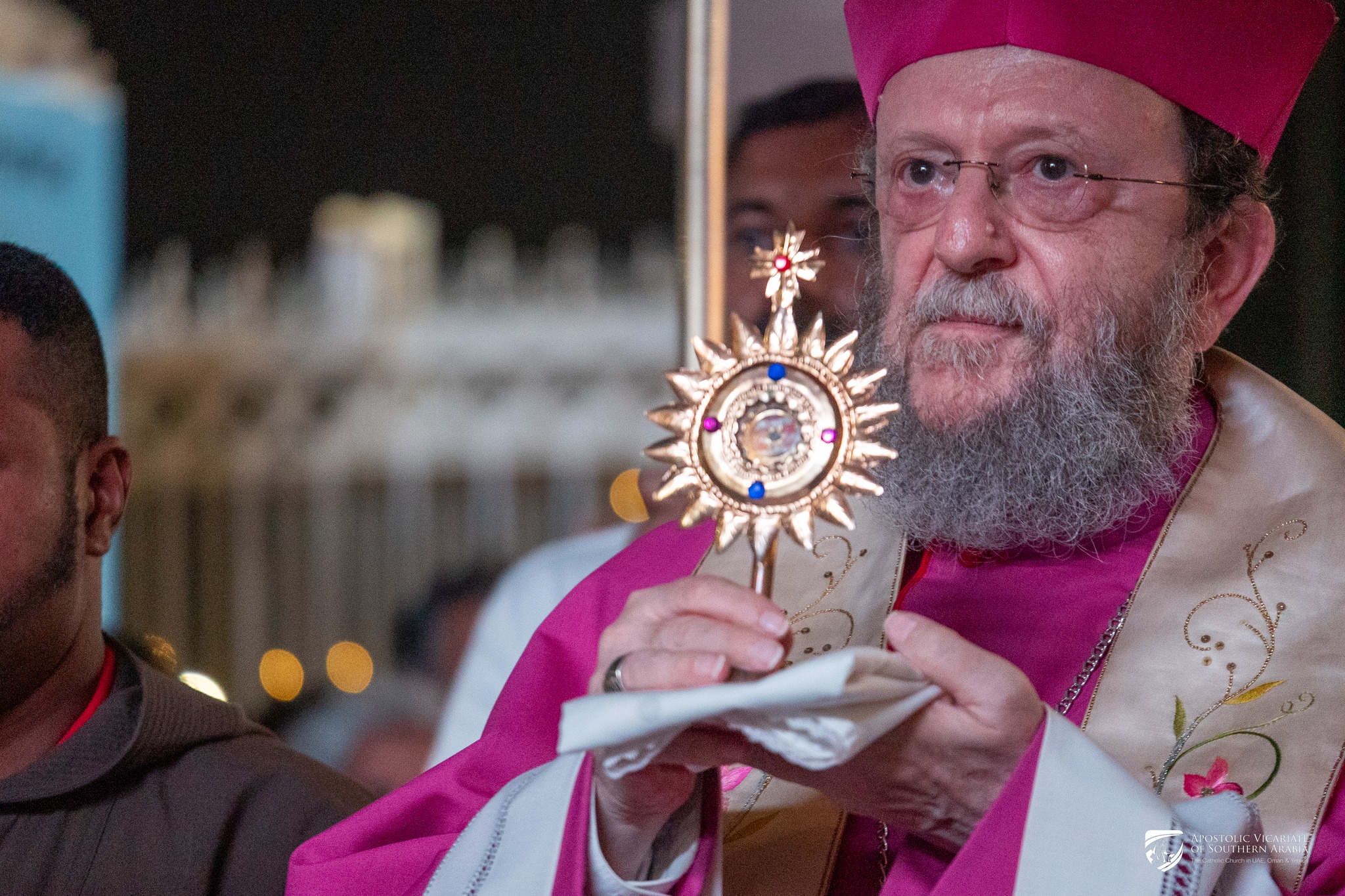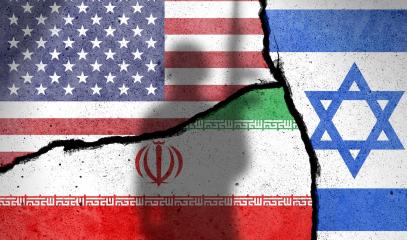Vicar of Arabia: Christians are “pilgrims of hope” in a Gulf that is a “pathway for diplomacy”
In a situation that remains “worrying” despite the ceasefire between Israel and Iran, Monsignor Martinelli recalls that “the possibility of dialogue must never be abandoned”. The document on brotherhood is a “response of peace to violence”. Prayer and friendship initiatives at the Abrahamic Family House in the footsteps of St Francis. Places are needed to “experience hope, peace and reconciliation”.
Milan (AsiaNews) - ‘We cannot in any way give up on the prospect of diplomacy. However worrying and tense the situation may be, we must never abandon the possibility of dialogue between the parties,’ Msgr. Paolo Martinelli, apostolic vicar of Southern Arabia (United Arab Emirates, Oman and Yemen), shares with AsiaNews, commenting on the latest war front between Israel and Iran. For days the escalation gave rise to fears of a regional - and global - spread of the conflict, and which seems to have ended yesterday after US raids and the truce ‘imposed’ on the parties by US President Donald Trump. New blood has been shed while people continue to die in Gaza, amid the silence and indifference of the international community. ‘I think that Oman, thanks to its historic capacity for mediation, could continue to play a significant role,’ said the prelate, together with the Emirates. In the long interview, the vicar also recalled Pope Leo XIV's invitation to be a ‘Church united for the life of the world,’ which is even more valid in a migrant reality "with different languages, cultures, traditions and rites [...]. These realities exist; they are seeds of hope. At a time like this, when violence seems to prevail, we have a duty to be pilgrims of hope and to promote experiences of good life."
Below is the interview with Msgr. Martinelli:
Your Excellency, what are the reactions in the countries of the vicariate, especially the Emirates, to Israel's attack on Iran and the involvement of the United States? Is there concern about escalation?
There is concern throughout the region about what is happening these days. However, the situation in the Emirates and Oman is in fact calm and daily life has not been restricted so far. The situation remains critical in Yemen, especially in the north, where the conflict between Israel and Iran is compounded by an already very difficult situation. In fact, since the beginning of the war between Israel and Hamas, the Houthis have been involved both by directly attacking Israel and by disrupting shipping in the Red Sea. Yemen has in turn been hit in response.
The Emirates are dear to Christians because of the document on “Brotherhood”: in a context of persistent conflict, from Gaza to Tehran, is there a risk that this common mission could fail?
The document on Human Brotherhood has opened a new chapter in the history of interfaith relations, and the current serious difficulties accentuate the importance of that document, which today seems even more important than when it was signed. The document was signed in memory of the historic meeting between St Francis of Assisi and the Sultan of Egypt, Al-Malik al-Kamil. That meeting took place during another conflict, the Crusades, and was a response of peace to that violence. The document signed in Abu Dhabi clearly denounces any exploitation of religion.
Why is it still relevant and fundamental?
Today more than ever, there is a risk of justifying violence linked to partisan interests in the name of God, but this remains an abomination! It must always be denounced as false! In this way, the authentic meaning of religious experience is lost. I think it is important to reaffirm the importance of this document, to continue to study it and disseminate it. As Pope Leo clearly said, “We must never get used to war!”, the document Human Fraternity helps us to keep alive a critical conscience in the face of violence, as Pope Francis has repeated many times.
What are the relations with the Shiites in the Gulf countries?
I can answer for the countries I know: in my experience and knowledge, Shiites are well integrated in the United Arab Emirates and also in Oman. I have never heard of any specific problems. In Yemen, the situation is different: the Houthis are Shiites and rule in the north of the country. There are still strong tensions there, which have characterised the civil war in recent years, although the general internal situation has improved compared to the past.
Are there any prayer initiatives for peace in the vicariate? I am thinking of the House of the Abramitica Family: are there any moments of prayer, initiatives or activities?
Since 7 October 2023, the theme of peace, in the world and in particular in the Middle East, has been constantly referred to in all the realities of the Vicariate. In our celebrations there is always a prayer for peace. I myself have written several letters to the faithful calling for initiatives of fasting and prayer for peace. I always refer to the importance of being peacemakers and bridge builders. Recently, I have strongly emphasised Pope Leo's desire and invitation to be a united Church, to be a sign of unity, peace and reconciliation for the whole world.
As for the Abrahamic Family House, all three houses of worship - the mosque, the synagogue and the church - never fail to pray for peace, each in its own way. Our church of St. Francis, for example, holds a monthly ecumenical prayer in the style of Taizé where, also in light of the 1700th anniversary of the Nicene Creed, we invoke peace. In addition, the daily rosary with the community is dedicated to Mary, Mother of Hope and Mother of Peace: this helps our faithful to see peace on the horizon of the Jubilee. Finally, we usually recite the so-called ‘simple prayer’ attributed to St. Francis of Assisi: ‘Lord, make me an instrument of your peace.’
Monsignor Martinelli, how relevant is his message today?
At this moment, the Abrahamic Family House is an eloquent and daily testimony to peace, to the possibility of coexistence through concrete relationships of friendship between men and women of different religions. I believe that the very existence of a place like this is a constant invitation to peace and coexistence.
The vicariate includes two territories that, in these weeks of conflict and tension, have played a leading role, albeit on different fronts: the Houthi attacks on Israel began in Yemen, while fragile nuclear talks between Washington and Tehran were attempted in Oman, which then collapsed following the Israeli attack. Is there still room for diplomacy?
The prospect of diplomacy cannot be abandoned in any way. However worrying and tense the situation may be, the possibility of dialogue between the parties must never be abandoned. This is also because armed conflict is never the solution. Peace must always come through dialogue that goes beyond the confrontation between military forces in the field. I believe that Oman, thanks to its historical capacity for mediation, could continue to play a significant role. The United Arab Emirates itself could play an important mediating role, thanks to its ability to maintain good diplomatic relations and cooperation with many countries.
Your Excellency, the Church is celebrating the Jubilee Year: from your vantage point in the Gulf, where and how is it possible to nurture and nourish hope in a context of permanent conflict?
We are experiencing the Jubilee Year very intensely. Being pilgrims of hope is a very important experience for us migrants. I always invite our faithful to see their migrant identity from the perspective of being pilgrims of hope. Hope is a person, it is Christ, the “God with a human face”, and this is very clear in our often precarious situations. In faith, we recognise him present among us and in history, even in the tribulations of the present moment. He has conquered death forever and accompanies us faithfully, allowing life to continue despite our shortcomings and the violence that marks so many parts of the world today. To nourish this hope, we need good relationships, places where it is possible to experience hope, peace and reconciliation.
This seems to me to be the meaning of Pope Leo's invitation to be a Church united for the life of the world: it is an invitation for our families, for the relationships between us, in our communities made up of people from over a hundred different countries, with different languages, cultures, traditions and rites. I also think of the positive ecumenical relationships we can cultivate. I think of the dialogue between people of different faiths who respect each other, overcome prejudices and decide to walk together to promote the common good and human fraternity. These realities exist; they are seeds of hope. At a time like this, when violence seems to prevail, we have a duty to be pilgrims of hope and to promote experiences of good life.
12/02/2016 15:14








.png)










